My favourite fable - The Raven and The Fox
What is it with fables? What makes us memorize these usually short stories? Is it because these animals remind us of someone we know or is there more?
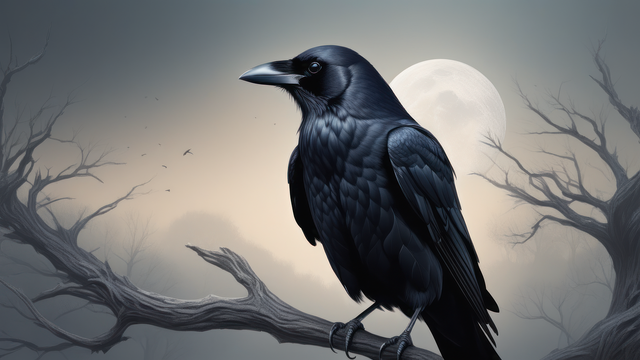 source
source A fable
is a story in which animals live, think and talk just like humans, or at least that is what Mr. Owl of "The Newspaper of Fables" says. "De Fabeltjeskrant" is a Dutch series for children. Generations of children (and parents) watched those 5 minutes before bedtime.
It is difficult to say what my first encounter with the realm of fables was. Was it this daily 5-minute program "The Newspaper of Fables", were it the stories about the three little piglets my aunt made up, the magazine Donald Duck or was it the moment I discovered the book of La Fontaine's fables on a high bookshelf? I can still see myself standing on my tiptoes reaching for that book.
I love stories,
I love the rhyming oned, even though they may not be easy for many to read, but an advantage of a rhyme is that the message will be remembered better. We flawlessly remember children's rhymes, which also occur in many song lyrics, not to mention the commercials from the 60s and 70s.
A fable is a short story where animals (or plants) behave like humans. This story is written in rhyme.
My favourite fable?
I love them all, each fable in itself is a poem from which a lesson can be learned. It remains to be seen whether this lesson is the same as its author had in mind. I wrote several myself. Just like fairy tales and the news, the origin message of the fable changed through the actions of the storyteller or the film industry.
When I think of a fable, 'The Raven and the Fox' is the first that comes to mind. Perhaps because of the wheel of cheese (I love cheese) with which the jet-black raven sits in the tree or the clever fox for which, like the wolf, I have always had empathy.
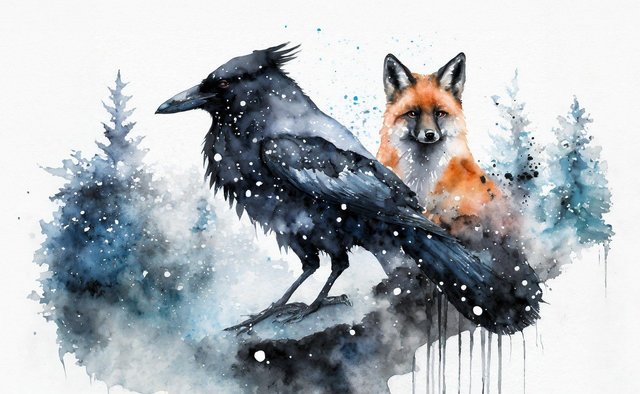 source
source A Dutch version of "The Raven and the Fox"(google translation):
" Master Raven sat in an oak tree.
He clutched a delicious piece of cheese from Gouda in his mouth.
Master fox, lured by this dream
of smell, looked up and said: "Doctor Honoris Causa,
You with your wise and all-seeing eye
And with your shining black cassock,
If your vocal organ is as beautiful as your feathers
then every animal must honour you like a phoenix!"
Master Raven, moved by so much honour,
Bounced from branch to branch and leaned forward a little,
Then looked down proudly over its beak
Here's to master fox and making his voice heard
He yawned with his mouth very wide.
But yes, he lost the cheese then.
He still gulped at it, looking down sadly.
The fox took his prey and then sighed happily:
"Remember, my dear sir,
Every flatterer gives his honour
To friends spoiled by fate
Who consider themselves important.
This wise lesson, alas,
Will this piece of cheese cost you?"
Ashamed, the raven hid in the oak branches
And then croaked somewhat belatedly: "You won't catch me again!"
The Dutch version of this story is different from the French. No French person will eat a piece of Gouda cheese, perhaps give it away, but the average French raven cannot steal it plus ravens are rare.
Although the raven is depicted as a stupid animal, it is very intelligent and even makes a pact with wolves. Ravens tell wolves where to find dying animals. It sounds like a great clean-up service from Mother Nature to me. By the way, Ravens did not occur in the Netherlands and Belgium, by now there are about 125 couples (since the 70s).
Why is it that this black bird
appeals to the imagination? In fact, in this fable, two very intelligent animals compete for a cheese and the fox, known for his cunning, manages to steal the cheese from the raven, who is said to be vain.
In reality this bird is different from what is told. The Germanic God Wodan had two ravens as messengers and in the fable (perhaps one of the longest in rhyme) "Van den vos Reynaerde" the raven Tiecelijn is also the messenger. The raven is also the king of the sun.
Perhaps it was Christianity that gave this bird the bad name as scavenger and others, making it the sign of the sinner, partly due to its black feathers.
Anyone who observes animals objectively can learn a lot from them.
They are certainly not as black and white as they are depicted in fables, which is still the case in modern fairy tales and animations. As far as fables are concerned, the animals represent a character trait that humans believe should be punished and with that we forget how to survive, stand for our rights and set boundaries.
While the cheese thief is deviously robbed in this fable because he is so vain, the fox is rewarded for his cunning. Is there a lesson to be learned from this today? For me, that would be: scamming is rewarded and know thyself (that raven should know he is not a nightingale).
The lesson from the past would have been: vanity is the devil's ear cushion (as my grandmother always said and indeed one of those Christian expressions). Depending on the age we live in, the story changes.
Personally, I don't think a freshly washed face, combed hair, being neatly dressed when you go outside is a sign of vanity but of being well groomed. It feels as if modern people no longer care about themselves. Uncut and unshaven is supposedly the trend.
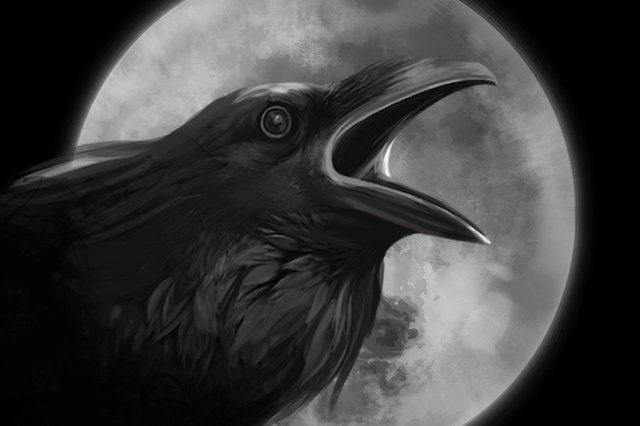 source
source What if you can't sing? Does this mean you are a hated bird, or is 'the messenger' always hated?
The raven has been deceived, but it may be he hoped to hear a compliment.
We all know that those who are always vilified and have a bad reputation will not easily hear a nice word.
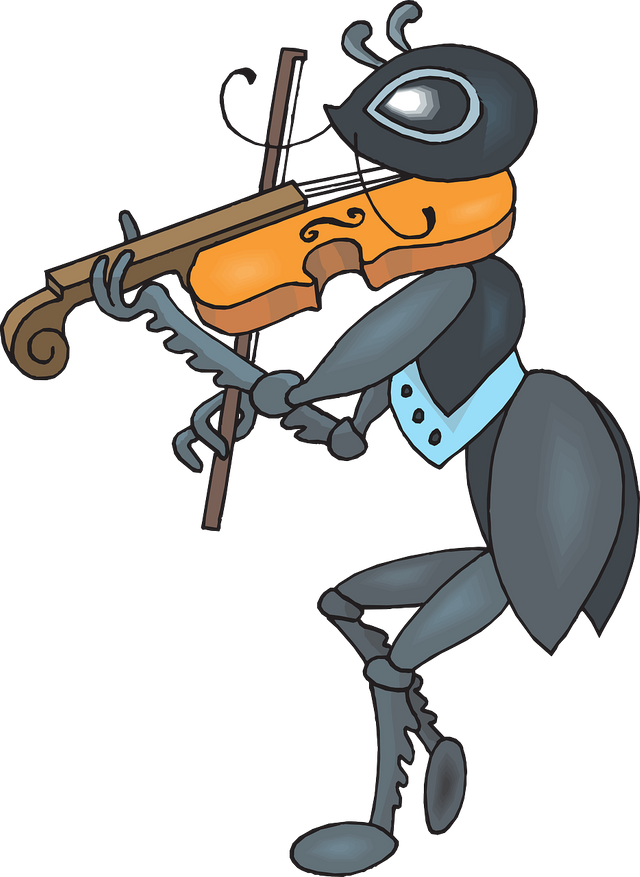
source
Another favourite fable
is about "The Grasshopper and the Ant". This story has changed over the centuries in terms of the author's message. In this case, the writer was not concerned with the hard-working ant who tells the grasshopper: Those who do not work won't eat, but with the ungrateful ant who enjoyed the grasshopper's music while working, but was unwilling to reward the artist for it.
This fable is about an ungrateful society (ants) that does not reward artists (grasshoppers) for their creativity while making life easier, more enjoyable and even beautiful (like: stories, paintings, music, and for modern people also films, games and this platform that we enjoy in our spare time ).
An interesting fact is that fables and fairy tales are no longer seen as stories with a message, a story we can learn from. There are Christians who say these tales are messages from the devil and their children are not allowed to read or hear them.
There's a Dutch expression: It all part of the empire of fables meaning: it's a lie, made up, fake news. Is it?
Jean de La Fontaine (8 juli 1621 - 13 april 1695) was a French writer born in Château-Thierry.
One of his most famous fables is "La cigale et la fourmi" (The Grasshopper and the ant). Le corbeau et le renard (The raven and the Fox) are based on a fable of Aesopus.
I invite @miswarofficiall, @eveetim, @blessedlife, @patudoh and @patjewell to share their favourite fable. If you tag me I read you.
This contest is hosted by Steem of Animals!
Videos: YouTube
Pictures: pixabay.com
Banner: mine
14-2-2024
I am a mobile phone user only
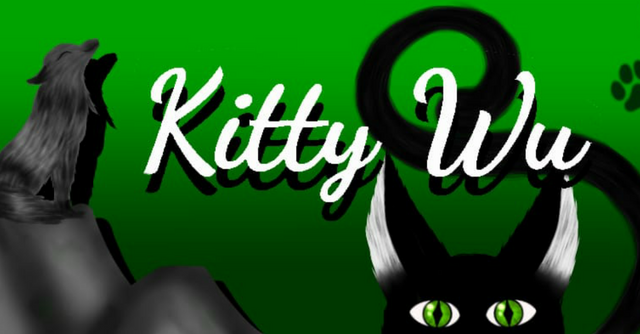
#steemexclusive #club5050 #holland #favoritefable-s2 #creativewriting #life #kittywu
Upvoted. Thank You for sending some of your rewards to @null. It will make Steem stronger.
You are welcome.
🍀❤️
https://x.com/wakeup_kitty/status/1758616447239000406?s=20